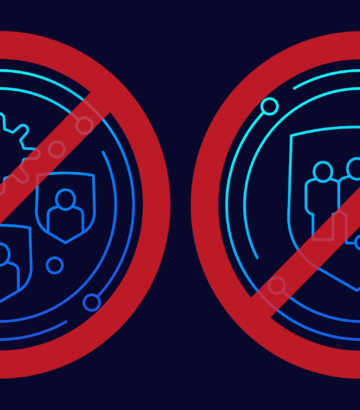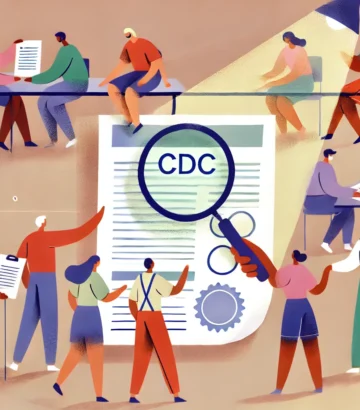Complaint of Gross Misconduct Relating to CDC’s Violation of the Information Quality Act
June 24, 2024
The present complaint is hereby filed with the Health and Human Services (“HHS”) Office of Inspector General (“IG”) via the IG’s website entitled “Submit a Hotline Complaint”. The accompanying document entitled “Supporting Evidentiary Brief Relating to Information Quality Act Complaint” is submitted herewith under the Evidence section of the online filing form and provides supporting documentation and further detailed analysis.
The present complaint pertains to the updated isolation recommendations for COVID-19 of March 1, 2024 (“Violating CDC Guidelines”) published by the Center for Disease Control and Prevention (“CDC”). CDC failed to meet its obligations under the following guidelines, implementing section 515 of the Treasury and General Government Appropriations Act for FY2001, Pub. L. No. 106–554 (herein referred to as the “Information Quality Act”), by publishing its Violating CDC Guidelines:
- the HHS Information Quality Guidelines (“HHS Guidelines”) (developed in accordance with provisions of P.L. 106-554 and Office of Management and Budget (herein referred to as “OMB”) setting government-wide requirements directed at federal agencies under the Information Quality Act); and
- the “Final Information Quality Bulletin for Peer Review” (“Peer Review Quality Bulletin”), defining further responsibilities of agencies related to the Information Quality Act, 70 FR 2664, pages 2664-2677 (per the memorandum M-19-15 of April 19, 2019 of the OMB, entitled “Memorandum for the Heads of Executive Departments and Agencies”).
This Complaint further relates to a violation by CDC, with regard to the process leading to the issuance of Violating CDC Guidelines, of the Bulletin for Agency Good Guidance Practices, as found in the Federal Register, Vol. 72, No. 16, of January 25, 2007, pages 3439 and following (“Bulletin for Guidance Practices“).
This Complaint alleges gross misconduct against each of the following HHS employees because they knew, or should have known due to their respective high level administrative functions, that CDC was violating several Federal guidelines, as herein presented:
- Dr. Mandy Cohen, Director, CDC;
- Dr. Bao-Ping Zhu, Director of the Office of Science Quality and Library Services (OSQLS); and
- Hon. Xavier Bacerra, Secretary, HHS. (hereinafter the “Directing Employees”)
Please Note that this Complaint and the Supporting Evidentiary Brief are being sent to Hon. Xavier Becerra, Dr. Mandy Cohen, Dr. Bao-Ping Zhu and Hon. Xavier Bacerra both via email as a PDF attachment and physically in paper form via Federal Express.
Violations by CDC:
For the following reasons, documented and expanded upon in the Supporting Evidentiary Brief relating to Information Quality Act Complaint submitted herewith, CDC stands in violation of HHS Guidelines and the Peer Review Quality Bulletin for the following reasons:
- CDC fails to meet its requirements under section II of the Peer Review Quality Bulletin by not disclosing the identity of the peer reviewers for Violating CDC Guidelines, as required because its content is considered “Influential Scientific Information” under the Peer Review Quality Bulletin.
- There is, in fact, no statement that Violating CDC Guidelines has even been peer reviewed, as required under section II of the Peer Review Quality Bulletin;
- CDC fails to meet its requirements under section III of the Peer Review Quality Bulletin, for highly influential scientific information, by:
- omitting to disclose the identities of the peer reviewers;
- failing to ensure that the peer reviewers who are Federal employees meet the applicable statutory and regulatory standards for Federal employees (per Section III(3)(b) of the Peer Review Quality Bulletin);
- failing to provide the opportunity for public participation in reviewing the Violating CDC Guidelines per Section III(5) of the Peer Review Quality Bulletin and by misrepresenting to the public that the guidelines are to be released in April 2024 for public feedback, and then releasing the Violating CDC Guidelines as policy on March 1, 2024 without allowing the population to comment upon the new guidelines; and
- neglecting to generate a peer review report as required under Section III(6) of the Peer Review Quality Guidelines, disclosing the name of each peer reviewer and a brief description of his or her organizational affiliation, credentials and relevant experiences;
- Violating CDC Guidelines relates to information on the risks to human health, safety, and the environment, and is in violation of HHS Guidelines by failing to comport with the 1996 amendments to the Safe Drinking Water Act (42 U.S.C. 300g-1(b)(3)(A) & (B) ), and more particularly paragraphs 42 U.S.C. 300 g-1(b)(3)(B)(iii)(iv)(v), by failing to provide, at least for long COVID:
- each appropriate upper-bound or lower-bound estimate of risk regarding long COVID;
- each significant uncertainty identified in the process of the assessment of public health effects and studies that would assist in resolving the uncertainty about the conclusion that “the prevalence of Long COVID also appears to be decreasing”, when the CDC’s own data on long COVID contradicts this finding; and
- all peer-reviewed studies known to the Administrator that support, are directly relevant to, or fail to support the estimate of public health effects that “the prevalence of Long COVID also appears to be decreasing” and the methodology used to reconcile inconsistencies in the scientific data. CDC has instead cherry picked only a small sample of such studies.
The conclusions presented in the Violating CDC Guidelines appear to contradict CDC’s own data reports (presumably peer reviewed due to the influential nature of the information) regarding long COVID. For instance, as taken from CDC’s March 4, 2024 update on the Household Pulse Survey on Long COVID (https://www.cdc.gov/nchs/covid19/pulse/long-covid.htm, consulted on March 17, 2024), the data shows an increase in the number of Americans with long COVID, and not a decrease.
For the above reasons, CDC is in violation of the guidelines adopted under the Information Quality Act.
Moreover, CDC is in violation of section IV of the Bulletin for Guidance Practices with regard to the adoption process leading to the publication of Violating CDC Guidelines. Because Violating CDC Guidelines qualifies as an economically significant guidance document:
- CDC failed to publish a notice to the Federal Register that a draft version of Violating CDC Guidelines was available. In fact, a draft document of the Violating CDC Guidelines appears to never have been posted anywhere;
- CDC omitted to make the draft document of Violating CDC Guidelines available to the public;
- CDC neglected to invite public comment on the draft of Violating CDC Guidelines; and
- CDC never prepared and posted on the CDC’s website a response-to-comments resulting from the invitation for public comment pertaining to the draft Violating CDC Guidelines.
(Please note that following the possible release of further information by CDC, Complainant may amend this complaint).
Remedies Sought:
Wherefore, the Complainant prays the Inspector General to:
- investigate whether peer review has been conducted leading to the dissemination of Violating CDC Guidelines;
- if such peer review has been conducted, order the disclosure of the identities of the peer reviewers as required under Section II of the Peer Review Quality Guidelines;
- order the withdrawal of Violating CDC Guidelines because its adoption violates the Information Quality Act;
- order that CDC revise Violating CDC Guidelines, and in the process of such revision, comport with the requirements of HHS Guidelines and the Peer Review Quality Bulletin by but not limited to:
- conducting peer review that satisfies the requirements under the Peer Review Quality Bulletin;
- conducting public comment per the Peer Review Quality Bulletin;
- disclosing all peer-reviewed studies known to the Administrator that either support, are directly relevant to, or fail to support any estimate of public health effects and the methodology used to reconcile inconsistencies in the scientific data in relation to long COVID;
- with respect to long COVID, specify each significant uncertainty identified in the process of the assessment of public health effects, and cite the relevant studies.
- In the alternative, if the Inspector General decides not order the withdrawal of Violating CDC Guidelines, we respectfully request that the IG:
- order the disclosure of the identities of the peer reviewers of Violating CDC Guidelines if peer review has been performed, or if it has not, declare that peer review has not been performed for Violating CDC Guidelines, and that such Guidelines therefore stand in the violation of the Peer Review Quality Bulletin;
- order that Violating CDC Guidelines be amended to disclose all peer-reviewed studies known to the Administrator that either support, are directly relevant to, or fail to support any estimate of public health effects and the methodology used to reconcile inconsistencies in the scientific data, especially with respect to long COVID; and
- order that violating CDC Guidelines be amended to include each significant uncertainty identified in the process of the assessment of public health effects, and any and all studies that would assist in resolving the uncertainty with respect to long COVID.
Respectfully submitted,
World Health Network











